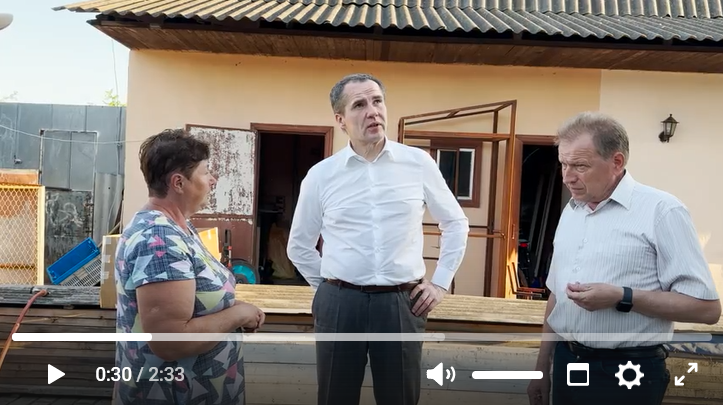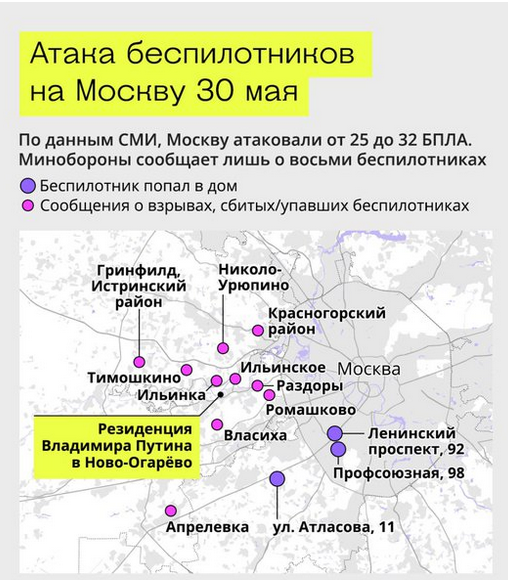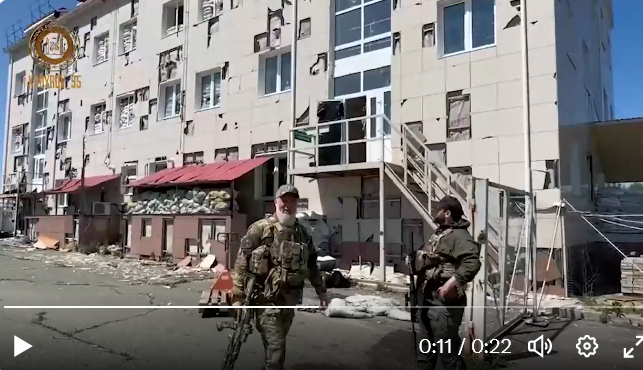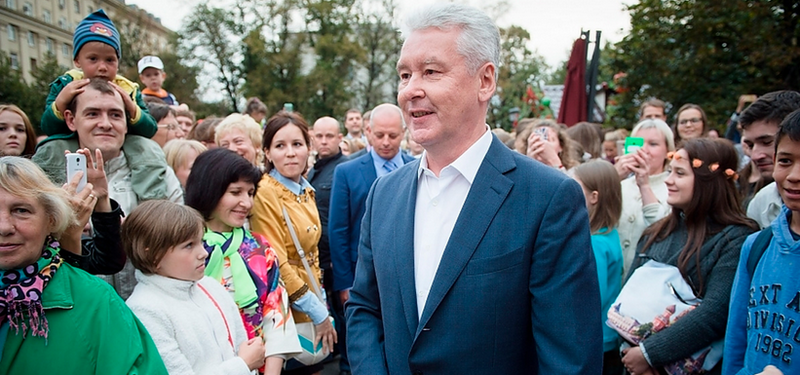President Putin continues to tell Russians that his 'special military operation' is more or less going according to plan, even after drones exploded in Moscow and armed groups did incursions in the Belgorod region. Meanwhile regional governors are addressing the concerns of the population. They are gaining autonomy and breaking down the strict centralised power structure of Putin's rule, argues Andrey Pertsev for Carnegie Politika.
 Belgorod's governor Gladkov visits village where houses have been damaged by artillery. Screenshot Gladkov's VKontakte page.
Belgorod's governor Gladkov visits village where houses have been damaged by artillery. Screenshot Gladkov's VKontakte page.
by Andrey Pertsev
For many Russians, their country’s war against neighboring Ukraine is no longer a distant conflict that has no impact on their lives. Drones loaded with explosives have darkened the skies of not only border regions, but Moscow, too, while cross-border incursions by armed groups are now a regular occurrence in the Belgorod region. All the while, Vladimir Putin continues to pretend that nothing major is happening. The president intends to fight this war to the bitter end, but in order to avoid ever appearing to have lost, he cannot clearly articulate its ultimate goals.
Amid this deafening silence, anyone who recognizes the new reality looks preferable. As the figures responsible for dealing with the aftermath of attacks and for trying to reassure the residents of their regions, Russia’s regional governors have found themselves in the spotlight, and may well be able to boost their popularity through effective crisis management.
The increased shelling of the Belgorod region—the first Russian region to find itself dragged into Putin’s war—and incursions by armed groups are likely the greatest test Governor Vyacheslav Gladkov has faced in his career, but they have also provided him with plenty of opportunities to excel. Parts of the region, including the town of Shebekino with a population of 40,000, regularly come under fire, and residents of at-risk areas are being evacuated en masse away from the front. Gladkov was even publicly negotiating a prisoner exchange at one point, though he then quickly fell silent, likely upon the Kremlin’s orders.
The governor has also said openly that the region has insufficient funds to restore infrastructure after the shelling. Back in the 1990s, it was not unheard of for powerful governors to talk publicly about budgetary problems, but in Putin’s Russia, it’s highly unusual.
It might seem that the federal leadership and Putin himself should be taking control of the tense situation in the region. But for now, any federal intervention has been limited to phone calls between the president and local authorities. Residents of the region have gotten no reassurances from Putin.
 Map of Moscow with spots where drones exploded on May 30
Map of Moscow with spots where drones exploded on May 30
Nor did the president have any words of support for Muscovites in the aftermath of the Moscow drone attack last month. Putin did eventually address the incident, but most of his tirade was devoted to the history of Ukraine and Russia. Instead, the reassurance came from Mayor Sergei Sobyanin, who said mobile teams of doctors were being set up in the city, promised to provide all necessary assistance, and tried to convince people that the city authorities would not abandon those impacted by the attacks.
'Flower mayor' Gladkov turns war-time governor
Over the course of the Russian invasion of Ukraine, Vyacheslav Gladkov has become one of Russia’s most well-known governors. He would not have expected this when he assumed office as governor of a relatively small and insignificant Russian region in September 2021. His Belgorod region now faces regular shelling by the Ukrainian army and raids by groups of volunteers who are fighting on the side of Ukraine, who first crossed the border into Belgorod on May 22.
In a recent profile by independent Russian news website Meduza, Gladkov is described as a career-driven technocrat with narcissist tendencies. Gladkov is said to have few personal convictions and to be someone ‘who understands what the authorities need and how to please them’. He was born in 1969 in a small village in the Penza region, south-east of Moscow. Gladkov made his first steps as a politician in the nearby city of Zarechny, climbing to the position of city manager in 2009. He implemented numerous projects to improve Zarechny’s socio-economic development, receiving the nickname of ‘flower mayor’. Around 2013, Gladkov became close to Aleksandr Kharichev, himself a close associate of Sergei Kiriyenko, deputy head of Putin’s presidential administration.
Three years later, Gladkov’s ties with Kharichev paid off: he was offered the position of vice-governor of Sevastopol, on the recently-annexed Crimean peninsula. Gladkov was brought in to help stabilize the political situation and to make sure Dmitry Ovsyannikov would win the gubernatorial elections in 2017. From here, Gladkov continued to climb Russia’s political ladder. In 2021, just as he was hoping to achieve his dream of becoming governor of his home region of Penza, he was appointed acting governor of Belgorod. There, he cultivated an image as ‘the people’s governor’, regularly posting videos of his daily life and participating in live Q&A-sessions on social networks.
 Kadyrov's men claim to guard Russian borderregion with Ukraine. Photo from twitter
Kadyrov's men claim to guard Russian borderregion with Ukraine. Photo from twitter
His attempts to develop his status as a model governor were thwarted by the Russian invasion of Ukraine. Soon after the invasion, fortifications were constructed along Belgorod’s border with Ukraine. Allegedly, Russian mercenary group Wagner was involved in its construction. The fortifications could not, however, prevent last month’s incursion by the Russian Volunteer Corps (RDK). When Gladkov declined RDK’s invitation to a meeting to discuss a prisoner exchange, Wagner-owner Yevgeny Prigozhin called him a ‘poorly educated and cowardly governor’.
This incident shows how the war has become a double-edged sword for Gladkov. Being a war-time governor may put him on track for future promotions, an attractive prospect for a career politician like Gladkov. On the other hand, he may also find himself becoming a scapegoat for any failures of his region’s defense. It remains to be seen whether the war will further Gladkov’s political career or prove to be his demise.
Same pattern as during pandemic
This is not the first time that the central government has adopted this hands-off approach. During the pandemic, Putin also stepped back from talking about problems and trying to solve them, instead transferring all powers—and responsibility—to the governors.
The logic back then was obvious. Russian officials were having to make difficult choices between unpopular lockdown measures and additional deaths. Either option was doomed to alienate at least part of the public.
While the ratings of governors dropped accordingly, Putin simply stood on the sidelines. He only began to talk about the pandemic once clear response protocols and vaccines had been developed. Then Putin reported on successes that had nothing to do with him, since he had not been involved in the decisionmaking process.
The current situation is potentially even more dangerous than the pandemic, and that is why Putin remains silent. As soon as the original plan—to take Kyiv in three days—failed, the president distanced himself from the military agenda.
Putin is neither willing nor able to stop the war and admit his mistakes. At the same time, he knows that attempting to put the country on a full-scale military footing would be extremely unpopular. Putin clearly expects to achieve his goal by attrition. In the meantime, he prefers to keep well away from issues that could jeopardize his ratings.
Russians prefer effective managers to moralizers
All of this will strengthen the position of the governors and some government officials, since the more the war encroaches onto Russia’s home territory, the more they will be needed. Opinion polls confirm that Russian society’s desire for stability is as strong as ever. According to research conducted by the independent sociological group Russian Field, in presidential elections, Russians would rather vote for an 'effective manager' than for a moralizer.
While Putin tells his people that 'everyone has to die, and it’s better to do so in war than from alcoholism,' and then descends into another polemic about the history of Ukraine, 'Anglo-Saxons,' and anti-colonialism, the governors simply say: 'all necessary assistance will be provided.' It’s not hard to see which is the winning rhetoric.
For many years, the Kremlin diminished the role of governors, turning them into mere executors of Putin’s decisions, his operational managers on the ground. The war—and the president’s self-isolation from real problems—has changed everything. The enforced publicity of regional leaders may serve to restore their genuine popularity and authority. Governors are finally starting to behave like real public politicians.
Responding to grassroot demands
There is no clearer illustration of this than the evolution of Gladkov. From managing a broadly positive agenda of promises of investment and posting upbeat videos on his Instagram page, he has now switched to full military mode, visiting bombed out areas and talking to those affected. And it’s paying off: his approval rating is close to 90 percent, an unprecedented figure among Russian governors.
Both Gladkov and Sobyanin understand that the average Russian does not really differentiate between the spheres of responsibility of governors versus the federal government, and that in any case, they will seek answers from whomever is closer. The regional heads anticipate grassroots demand and respond to it. In other words, they are doing what Putin stopped doing long ago.
 Moscow's mayor Sobyanin just started his reelection campaign. Photo from Sobyanin.ru
Moscow's mayor Sobyanin just started his reelection campaign. Photo from Sobyanin.ru
Having permitted themselves to show initiative, these regional politicians are still only working to achieve specific tactical goals rather than far-reaching plans. Gladkov monitors his rating zealously, while Sobyanin is mindful of September’s mayoral elections. But everything that is happening shows that amid the state of semi-paralysis within the power vertical, those nearer to the bottom of it are gaining unprecedented autonomy, and that if needed, Russian officials are prepared to disregard the seemingly unbreakable rules of that vertical. In the event of the system’s destruction, these people will not simply disappear. They will integrate into the new order—or even start to create new orders themselves.
This article was published originally by Carnegie Politika
